You might have come across many fitness apps like Strava, MyFitnessPal. But Peloton distinguishes itself as a leader in the fitness industry.
As of early 2024, Peloton has more than 6 million members, with around 3 million subscribing to its connected fitness services. This is huge!
However, if we look at the market size of the fitness industry, it is projected to reach $33.58 billion by 2033.
Well, this surge is driven by increasing health awareness and technological advancement. This leads to a shift towards home-based fitness solutions.
Thus, if you are inspired by Peloton’s success and the fitness industry’s growth, then now is the time to build an app like Peloton and become the next industry leader.
If you have decided to invest in the same, then this blog is for you.
In this blog, we will discuss how to build a fitness app like Peloton, along with the must-have features, development costs, and other aspects that will help you reach new heights.
So, let’s begin!
Overview of the Peloton App
Peloton is the most popular on-demand fitness application that allows users to
Join live and on-demand workout classes from anywhere. They can do cycling, running, yoga, strength training, and meditation from their mobile app.
What makes Peloton different is its strong sense of community and real-time motivation. Users can join leaderboards, compete with others, or simply follow their own pace.
As one of the best fitness apps, Peloton gives a studio-like experience at home without interactive classes, personal progress tracking, and energetic instructors that make every workout feel engaging and fun.
Let’s have a look at some interesting facts about Peloton:
- Peloton has about 6 million members on its platform.
- Roughly 3 million users are paid subscribers.
- In 2024, Peloton made $2.71 billion in revenue.
- The 12-month retention rate for connected fitness subscribers is over 90%.
On-Demand Fitness Market: Statistics and Figures
The on-demand fitness industry is growing fast. Let’s justify this statement with the following fitness app statistics.
As per Grand View Research, the market size of the on-demand fitness industry is forecasted to increase up to $33.58 billion by 2033.
This is increasing at a 13.59% yearly rate. The surge in online health solutions, wearable technology, and customized fitness experiences boosts the fitness applications.
However, if we look at the fitness apps revenue, it is projected to reach $9.89bn by 2030. Also, the user penetration of fitness apps is forecast to reach 13.25% by 2030.
But most revenue will be generated from the USA.
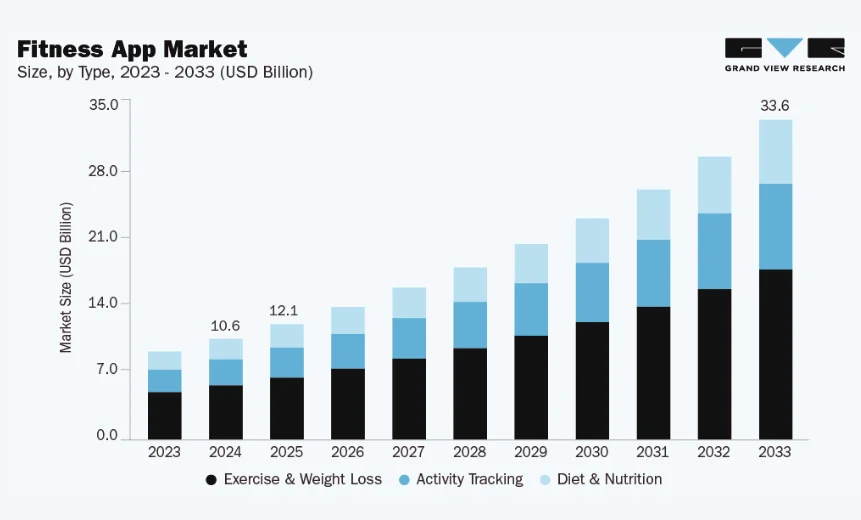
As per Statista, worldwide users downloaded around 25.15 million fitness apps in January 2025. This shows that now is the best time for fitness businesses to invest in Peloton app development.
Why Should Businesses Invest in Developing an App like Peloton?
If you are a fitness business startup looking to enter a high-growth market, investing in an on-demand fitness tracker app like Peloton can unlock huge revenue, customer loyalty, and long-term brand value.
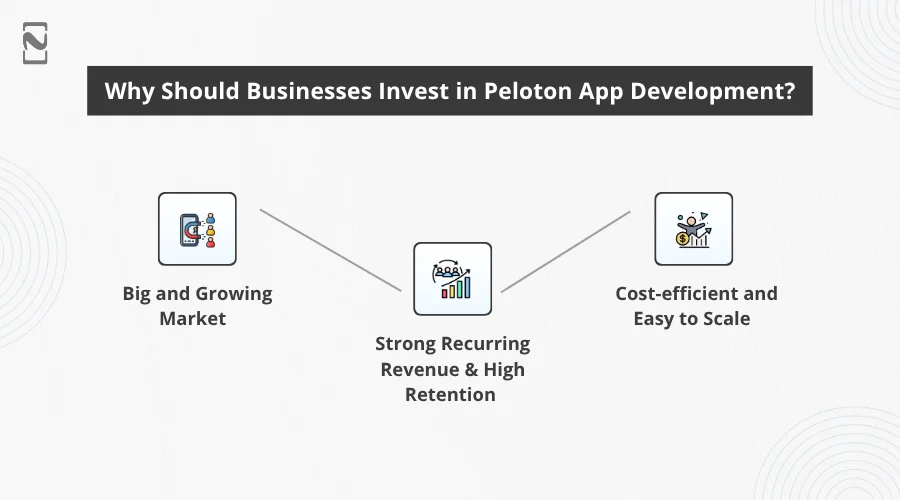
You can check out the reasons below to invest in Peloton app development.
♦ Big and Growing Market
People are becoming health-conscious in today’s times. They want flexible fitness options and, of course, digital.
As we have seen above, the worldwide market size of fitness apps is projected to grow $33.58 billion by 2033.
This means there is increasing demand and lots of space for new or better fitness apps like Peloton.
So, if you are planning to build an app like Peloton, do not miss this golden opportunity.
♦ Strong Recurring Revenue & High Retention
An application model means subscription income, which can be more stable than one-time sales.
For instance, Peloton had around 2.88 million paid connected subscriptions in a recent quarter. This maintains stability even when hardware sales declined.
Its churn rate means how many people leave was very low, around 1.2% per month in some periods.
That means users tend to stick with it, which is great for your business and a predictable income.
♦ Cost-efficient and Easy to Scale
Once content is created, distributing to more users costs relatively less as compared to gyms or some physical spaces.
You do not require many physical locations. Most cost is in production, technology, and user experience.
Also, Peloton’s shift shows how much revenue comes from its subscription services. In 2024, subscription revenues exceeded $1.7 billion and made up over 60% of Peloton’s total revenue.
So, this shows how digital fitness apps can grow fast and keep profits steady with powerful operational costs.
How to Build an On-Demand Fitness App like Peloton?
How do you shift from fitness app ideas to Android or iOS? Well, this can become less scary if you decide the procedure to develop an app like Peloton into separate apps.
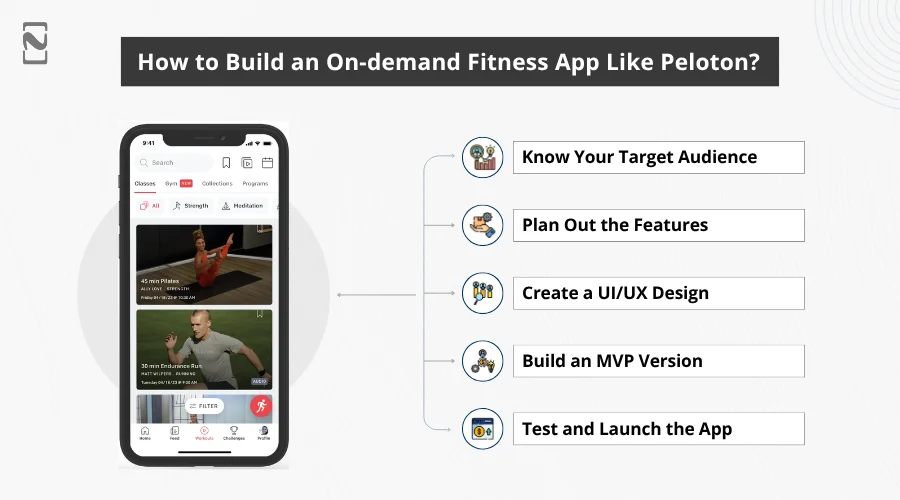
So, let’s take a look at the Peloton app development process.
Step 1: Know Your Target Audience
First of all, do not just look at the age or income of your potential audience.
Look at their daily routines, their frustration with gyms or current fitness apps, and what motivates them to move.
Also, you should always update with fitness app trends.
Additionally, some users want short, effective workouts, while others want live interaction or to track their progress.
Knowing this helps you build an app like Peloton that people actually use, not something that sits forgotten on their phone.
Step 2: Plan Out the Features
A successful on-demand fitness tracker app provides more than video workouts.
So, you can think about the features like live classes, on-demand sessions, progress tracking, integration with wearables, etc.
Now decide which ones are mandatory and which can be added later. But one thing to keep in mind is your budget.
On that basis, you should decide the features for your Peloton-like app.
Also, prioritize features that offer real value to users. You can see this as a smart investment because a well-planned app keeps users longer and improves retention and revenue.
Step 3: Create a UI/UX Design
In this step, to develop an app like Peloton, you should keep the fitness app design visually appealing and enjoyable.
Users should not find any difficulty in using the app. Just make the design smooth for users so they can start a workout in a few clicks and track their progress.
Also, smooth navigation, clean visuals, and motivational prompts can make a difference. A good design does not just look beautiful. It focuses on consistent usage.
Besides, you can think of UI/UX as your first impression; a confusing app can make a user uninstall quickly, no matter how good the workouts are.
Step 4: Build an MVP Version
Now, instead of creating a full-fledged fitness tracker app like Peloton in the beginning, you can build an MVP app that covers only the must-have features.
For instance, essential workouts, progress tracking, and others that we will discuss below.
This MVP approach allows you to test the market with minimum investment and collect real user feedback.
Also, you will get to know what features really give engagement. So, you can easily update or modify the data without any assumptions.
When a mobile app developer creates the MVP app, it helps them reduce financial risk, speed up the market research time, and show investors that their app idea is practical and scalable.
Step 5: Test and Launch the App
Are you in a hurry to launch your app? This can cause big losses. If you rush to launch the app without proper testing, it can backfire.
Bugs, poor user experience, or missing features can turn potential customers away. So, take your time to test the app with a small, targeted group and gather feedback.
For you, this careful approach is not just about avoiding mistakes; it is about turning early users into loyal customers.
This can help your app get engagement and increase revenue from subscriptions or in-app purchases.
A well-planned launch makes sure your fitness builds trust, creates lasting value, and boosts your business’s sustainability.
Must-Have Features to Add to a Fitness App like Peloton
Once you are well-versed with the process to develop an app like Peloton, it is time to decide what fitness app features your app should have.
These features form the must-have of your MVP that ensures your app is functional, engaging, and delivers real value to users.
So, below are the core features that include both the user panel and admin panel.
| User Panel Features | Admin Panel Features |
| User registration or login | Admin dashboard |
| Profile Management | User management |
| Workout Library | Instructor Management |
| Live classes | Class management |
| On-demand classes | Workout content upload |
| Class booking and scheduling | Subscription and payment management |
| Trainer profiles | Class management |
| Personalized workout plans | Feedback and review management |
| Activity tracking and history | Analytics and reports |
| Reviews and ratings | Push Notification Management |
| Fitness goal setting | Offer management |
Nice-to-Have Features for a Peloton-like Fitness App
Only the must-have features are not enough to make your on-demand fitness app successful.
You have to integrate the nice-to-have features that can help you stand out and give users that wow experience.
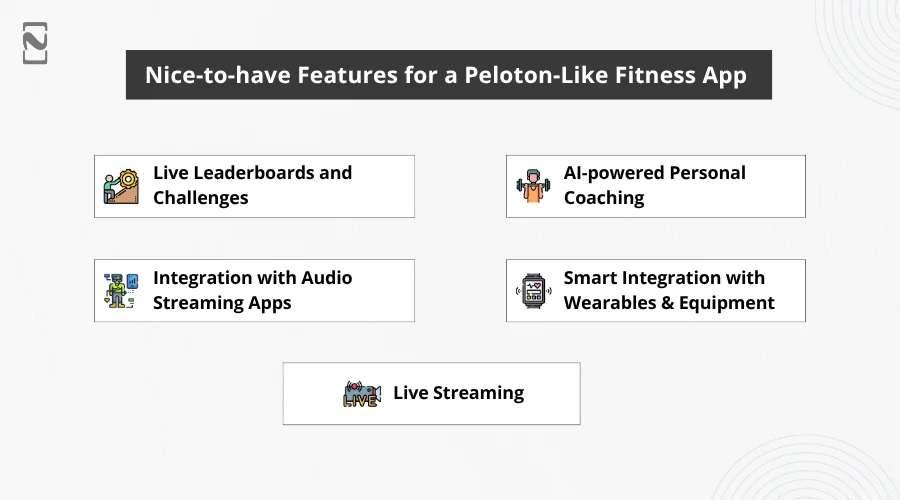
So, we have jotted down the advanced features you can integrate to make your fitness tracker app like Peloton feel premium and engaging.
-
Live Leaderboards and Challenges
When you integrate a leaderboard during live sessions, it makes the workout feel like a fun competition.
Users can challenge their friends or join global rankings, which pushes them to perform better and stay consistent.
-
AI-powered Personal Coaching
The integration of AI in fitness apps can act like a smart trainer. It analyzes users’ performance, suggesting workout plans, and adjusting difficulty levels automatically.
It is like having a personal coach who is available 24/7 without any extra charges.
-
Integration with Audio Streaming Apps
If you integrate audio streaming apps, you will make workout applications more enjoyable and personalized, just like how Peloton did.
Users can connect their Spotify, Apple Music, etc, accounts directly to your app and listen to their favorite playlists while training. It removes the hassles of switching apps between workouts.
-
Smart Integration with Wearables and Equipment
With wearable fitness technology features, you should allow users to connect their wearable devices, like smartwatches or gym bikes, directly with the app.
This seamless integration makes sure that all data syncs perfectly for a complete fitness overview.
-
Live Streaming
If you add live streaming sessions, your app will instantly feel more engaging and user-focused.
With this feature, trainers can host real-time classes, challenges, or even interactive Q&A rounds where users can join, comment, and participate together.
How Much Does it Cost to Build an App Like Peloton?
The cost of making an app like Peloton depends on what stage you are starting from.
If you are developing an MVP version to test the market, the Peloton app development cost can start around $25,000-$50,000.
This version usually includes must-have features like workout videos, basic tracking, and user accounts.
But if you plan to launch a more advanced, full-fledged fitness app with real-time performance tracking and live classes.
The cost to develop an on-demand app can go up to $70,000-$150,000 or more.
The cost to build an app like Peloton varies based on whether you are creating for a single platform or multiple ones, and how complex your design and backend systems are.
Also, remember that on-demand fitness tracker apps often need to work on different devices. So plan your budget accordingly.
At last, your fitness app development cost will depend on your app’s scale, design quality, and how feature-rich you want it to be.
How to Make Money From Your Fitness App Like Peloton?
When it comes to making money from your fitness app, there are a few fitness app monetization strategies that really work.
You can earn huge revenue from those strategies if you apply them correctly.
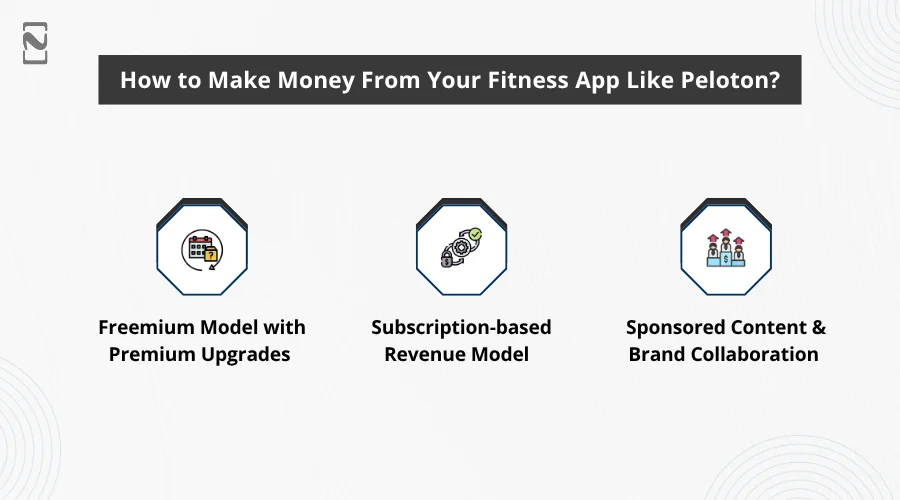
Let’s have a look at them.
1. Freemium Model with Premium Upgrades
This is one of the most user-friendly ways to earn money from an app like Peloton.
You can provide the basic version of your on-demand fitness tracker app for free to attract a huge number of users.
Once they start using it and find it useful, they will be more likely to pay for premium features.
The idea is to allow users to experience the mobile app first and then give them reasons to upgrade.
2. Subscription-based Revenue Model
This is most probably the most reliable and preferred way to make money from your fitness tracker app.
Instead of asking users to pay once, you can provide them monthly or yearly subscriptions to premium features.
For example, if your fitness application, like Peloton, is about fitness, you could give them personalized workout plans or expert advice.
You can even create different levels like basic, pro, or premium, so everyone finds something that fits their needs.
3. Sponsored Content and Brand Collaboration
Once your fitness mobile app like Peloton, has gained loyal users, brands will be interested in reaching.
You can feature products, run promotions, or create partnerships that actually help users.
For instance, a fitness app can collaborate with sportswear or nutrition brands. It is a win-win situation.
You earn money from the brands, and your users get recommendations that really add value to their experience.
Why Choose Nimble AppGenie to Develop an App like Peloton?
If you are about to build an app like Peloton, Nimble AppGenie is the one-stop destination.
Being a trusted fitness app development company, we understand how fitness apps need to connect users, track progress, and deliver smooth live workouts.
Our expert team focuses on creating visually appealing fitness applications with AI-powered technologies.
From workout apps to nutrition and diet apps, we have 8+ years of expertise in creating top-notch mobile fitness applications that align with your goals and budget.
Also, we actually listen to your dream project ideas and bring them to life without overcomplicating things and delivering on time.
If you choose Nimble AppGenie, you’ll feel like working with a partner and not just a developer.
Wrapping Up!
And that’s all for now! Now you know the process to develop an app like Peloton, one thing is clear that developing a fully-functional app requires more than just coding.
If you add the right features, a user-friendly design, and smart integration, your fitness app can really motivate users and build loyalty that can help your app stand out.
So, investing time in planning, understanding user needs, and choosing the right development team will make sure your app is not just functional.
It becomes a go-to fitness companion people love to use every day.
FAQs
To develop an app like Peloton, follow the steps below:
- Conduct market research
- Plan a crucial features list
- Design user interface
- Develop an MVP version
- Test and launch the app

Niketan Sharma, CTO, Nimble AppGenie, is a tech enthusiast with more than a decade of experience in delivering high-value solutions that allow a brand to penetrate the market easily. With a strong hold on mobile app development, he is actively working to help businesses identify the potential of digital transformation by sharing insightful statistics, guides & blogs.
Table of Contents




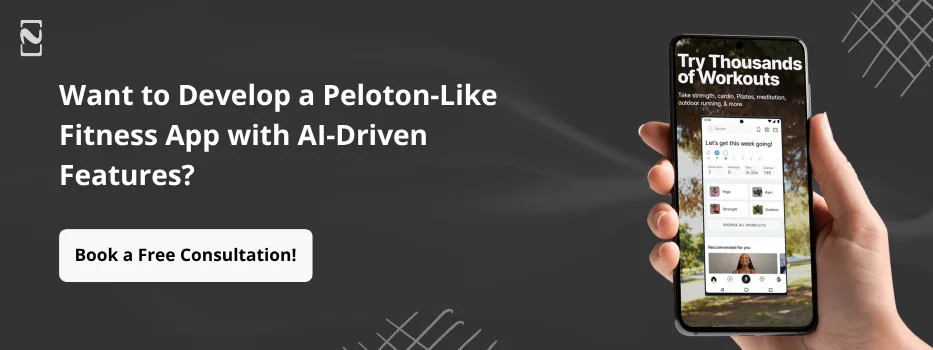
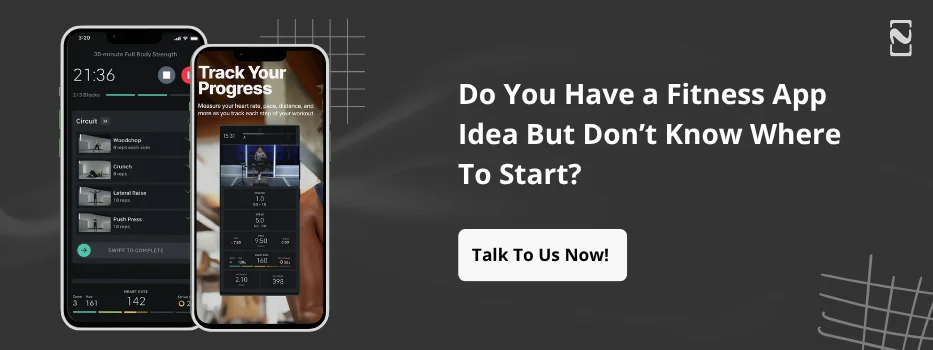
No Comments
Comments are closed.